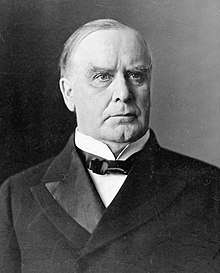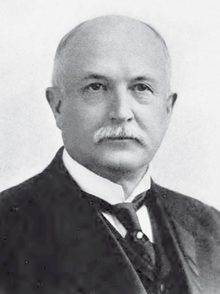1891 Ohio gubernatorial election
The 1891 Ohio gubernatorial election was held on November 3, 1891. Republican nominee William McKinley defeated Democratic incumbent James E. Campbell with 48.61% of the vote.
| |||||||||||||||||
| |||||||||||||||||
| |||||||||||||||||
| Elections in Ohio | ||||||||||||||||||||
|---|---|---|---|---|---|---|---|---|---|---|---|---|---|---|---|---|---|---|---|---|
.svg.png) | ||||||||||||||||||||
|
||||||||||||||||||||
|
||||||||||||||||||||
|
|
||||||||||||||||||||
|
||||||||||||||||||||
|
|
||||||||||||||||||||
General election
Candidates
Major party candidates
- William McKinley, Republican
- James E. Campbell, Democratic
Other candidates
- John J. Seitz, People's
- John J. Ashenhurst, Prohibition
Results
| Party | Candidate | Votes | % | ± | |
|---|---|---|---|---|---|
| Republican | William McKinley | 386,739 | 48.61% | ||
| Democratic | James E. Campbell | 365,228 | 45.90% | ||
| People's | John J. Seitz | 23,472 | 2.95% | ||
| Prohibition | John J. Ashenhurst | 20,190 | 2.54% | ||
| Majority | 21,511 | ||||
| Turnout | |||||
| Republican gain from Democratic | Swing | ||||
gollark: Yes.
gollark: It seems like score voting (or approval I guess, easiest change) would be the best system for voting. But there are a lot of annoying tradeoffs and weird issues. Also Arrow's theorem, but IIRC that only affects ranked ones.
gollark: That would probably cause problems. Especially since there's probably a lot of crazy law which is just mostly ignored.
gollark: Um.
gollark: That sounds pretty hard.
References
- "Guide to U.S. elections". Books.google.com. Retrieved 2020-07-11.
This article is issued from Wikipedia. The text is licensed under Creative Commons - Attribution - Sharealike. Additional terms may apply for the media files.

